“The Trump administration inherits a global nuclear non-proliferation regime that has been more effective and durable than many observers expected, but the regime may now be coming under stress,” Robert Einhorn, senior fellow in the Arms Control and Non-Proliferation Initiative, cautioned this week in a Brookings report, “Non-Proliferation Challenges Facing the Trump Administration.” Einhorn outlines seven key non-proliferation challenges the Trump administration will face and how it can counter them.
1Constraining North Korea’s nuclear and missile programs. North Korea’s burgeoning nuclear and missile programs present both a regional and global threat, Einhorn writes. A dual-track approach of pressure and negotiations stands the best chance of gaining the critical support of China and South Korea and arresting the growth of the DPRK’s destabilizing programs.
2Blocking Iran’s path to nuclear weapons. Despite Donald Trump’s campaign pledge to scrap the JCPOA, it would be in the U.S. interest to preserve the deal and strictly enforce it, while pushing back against provocative Iranian activities not covered by the deal, such as Tehran’s ballistic missile launches and use of proxies to expand its regional influence. Einhorn argues that the United States should also take steps to deter an Iranian decision to pursue nuclear weapons when key JCPOA nuclear restrictions expire after 10 and 15 years.
3Reducing incentives for other countries to seek nuclear weapons. Although no non-nuclear weapons states are currently believed to be pursuing nuclear weapons, the perception of weakened U.S. security assurances to allies could incentivize countries like South Korea, Japan, or Saudi Arabia to consider developing their own nuclear weapons programs. The Trump administration should demonstrate to those three countries that it is working with them to buttress confidence in the reliability of U.S. security guarantees.
 4Discouraging the spread of enrichment and reprocessing capabilities. The spread of those capabilities, while not currently a pressing threat according to Einhorn, would increase proliferation risks in the long run. The United States should discourage China from building a large commercial reprocessing plant, urge Japan not to re-start its Rokkasho reprocessing facility, support fuel-cycle free or reprocessing-free regional arrangements, and explore repositories for the final disposal of spent reactor fuel.
4Discouraging the spread of enrichment and reprocessing capabilities. The spread of those capabilities, while not currently a pressing threat according to Einhorn, would increase proliferation risks in the long run. The United States should discourage China from building a large commercial reprocessing plant, urge Japan not to re-start its Rokkasho reprocessing facility, support fuel-cycle free or reprocessing-free regional arrangements, and explore repositories for the final disposal of spent reactor fuel.
5Reinforcing the non-proliferation toolkit. The United States should improve the efficacy of current non-proliferation measures by strengthening the guidelines of the Nuclear Suppliers Group (NSG), pushing for universal adherence to the IAEA Additional Protocol, pressing to boost the IAEA’s budget, fostering cooperation in interdicting illicit procurement, increasing intelligence sharing, and continuing to support capacity-building programs.
6Sustaining momentum in nuclear security. Despite great progress in nuclear security in the past 25 years, Einhorn warns that the threat of terrorists acquiring weapons-usable nuclear material remains serious, and the momentum gained during the 2010-2016 Nuclear Security Summit process may be difficult to sustain. The Trump administration should press other countries to fulfill the commitments made during the summit process. An improvement in U.S.-Russian relations, which Presidents Trump and Putin say they support, could allow the restoration of some nuclear security cooperation that was suspended.
7Reinforcing the Non-Proliferation Treaty. Polarization among NPT parties has reached new heights, especially with many non-nuclear weapon state parties—frustrated with the pace of nuclear disarmament—supporting negotiations on a treaty to ban nuclear weapons, which the nuclear weapon states and their allies oppose. The Trump administration should try to ensure that a ban treaty doesn’t undermine the NPT. It should also take additional steps in support of its NPT Article VI obligation to pursue nuclear disarmament, explore ways of deterring abuse of the NPT’s withdrawal provision, and propose a more constructive NPT review process.
Einhorn concludes that, if the Trump administration gives non-proliferation the top priority it deserves in conducting its foreign and national security policies and exerts the leadership internationally that only the United States can provide, there is a very good likelihood that the success the global nuclear non-proliferation regime has enjoyed can be sustained well into the future.
Graphic designed by Rachel Slattery.
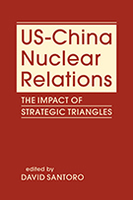
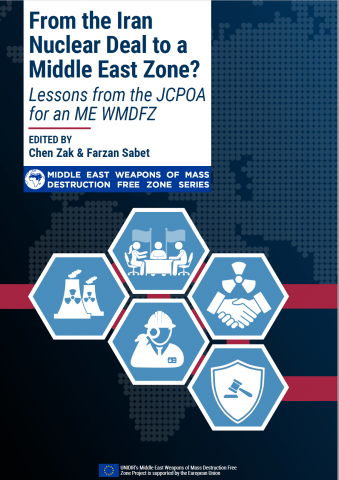
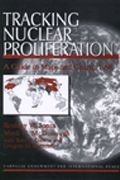
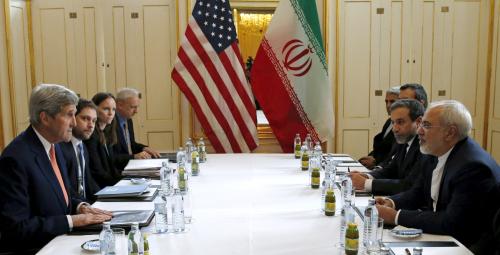
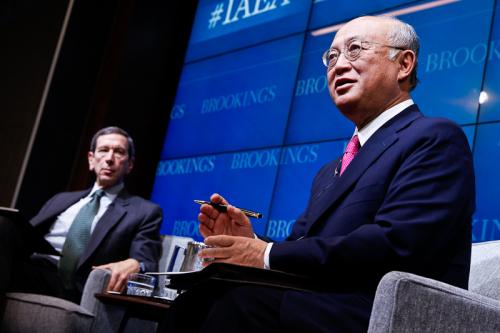
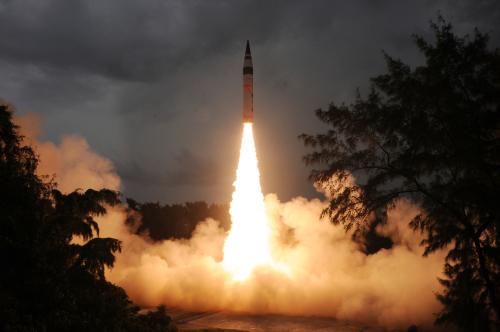


Commentary
Trump’s non-proliferation inheritance
March 8, 2017